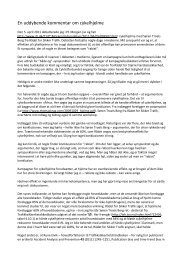Cykling, motion, miljø og sundhed - Thomas Krag
Cykling, motion, miljø og sundhed - Thomas Krag
Cykling, motion, miljø og sundhed - Thomas Krag
Create successful ePaper yourself
Turn your PDF publications into a flip-book with our unique Google optimized e-Paper software.
Conclusions and Recommendations<br />
More cycling would enhance the health of the Danish population. Less people would suffer from<br />
cardio-vascular diseases, diabetes 2, osteoporosis, and certain forms of cancer. In addition, public<br />
investments in cycle-initiatives would have a high socio-economic yield. Such investments should<br />
therefore have high priority in the government’s efforts to stimulate physical exercise and public<br />
health. Funding should be earmarked, so that municipalities interested in promoting cycleinitiatives<br />
can apply for the financial means.<br />
Physical inactivity threatens public health<br />
Bicycling presents a solution to a number of problems. Transportation requirements, health as well<br />
as pollution problems can be tackled simultaneously. In wealthy parts of the world, there is much<br />
focus these days on physical inactivity and obesity; and the reason is obvious: these problems<br />
threaten common health. Comprehensive studies from several countries all speak the same<br />
language: physical inactivity is a problem that, in terms of surplus hospitalization expenditure,<br />
equals alcoholism, and is half as expensive as smoking. Judged by the mortality rate alone,<br />
inactivity is as dangerous as smoking. Health authorities have sounded the alarm and recommend<br />
half an hour of physical exercise each day for adults, and one hour for children. This exercise<br />
should at least be on the level of brisk walking.<br />
Cycling reduces a variety of diseases<br />
A large Danish study has shown that people who take their bicycle to work have a 28% lower<br />
mortality rate than the average population (after adjustment for, among other issues, differences in<br />
terms of job, smoking, leisure-time activities, and body mass index). There is solid Danish evidence<br />
that physical exercise reduces the risk of developing the following diseases: heart attacks, diabetes<br />
2, osteoporosis, colorectal and breast cancer, as well as high blood pressure. International research<br />
also indicates that depressions, back-pains, and strokes can be reduced significantly. By following<br />
the exercise recommendations, one can diminish the risk of these diseases by 30 to 50 %. Thereby,<br />
one has not only a longer life in store, but can also look forward to more years in good health. If<br />
you ask road users themselves, those who cycle feel in better physical and mental shape than those<br />
who do not cycle.<br />
Physical inactivity is a big problem in Denmark, but in certain other countries, for example, Great<br />
Britain, it is even bigger. More and more people have sedentary life-styles, working with<br />
computers, driving cars, and spending their leisure-time in front of the TV. Cycling is no longer<br />
favored in many countries, including Denmark, although in some cities, such as Copenhagen and<br />
Odense, this trend has been reversed.<br />
Children are more and more often brought to school by car. Many children prefer to stay inside at<br />
breaks, and gym-class often has low priority amongst both school leaders and pupils. Although<br />
more children these days practice sport in their spare time than 20 years ago, it is still the case that,<br />
overall, more children are inactive nowadays. We have witnessed a polarization in terms of exercise<br />
level and physical fitness of the children. A Norwegian study has shown that children who are taken<br />
to school by car have significantly more backache problems and are less able to manage moderate<br />
physical challenges than children who cycle.<br />
- 11 -



